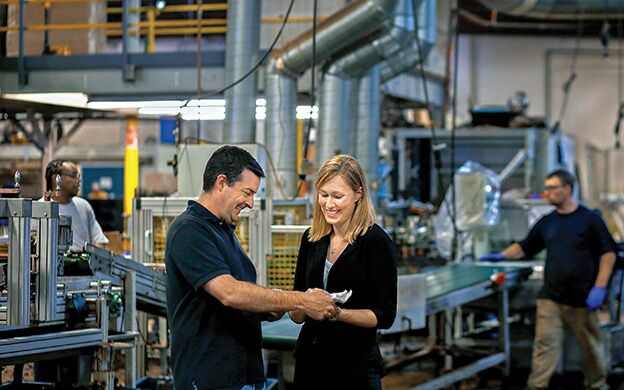Processing Your Payment
Please do not leave this page until complete. This can take a few moments.
- News
-
Editions
View Digital Editions
Biweekly Issues
- December 1, 2025
- Nov. 17, 2025
- November 03, 2025
- October 20, 2025
- October 6, 2025
- September 22, 2025
- + More
Special Editions
- Lists
- Viewpoints
-
Our Events
Event Info
Award Honorees
- Calendar
- Biz Marketplace
Maine Senate greenlights bioplastics jobs bill
 Photo / Tim Greenway
James Chittum, director of business development at Grow-Tech LLC, talks with Charlotte Mace, executive director of the trade group Biobased Maine, about her organization's efforts to create a “road map” for expanding biobased manufacturing in Maine.
Photo / Tim Greenway
James Chittum, director of business development at Grow-Tech LLC, talks with Charlotte Mace, executive director of the trade group Biobased Maine, about her organization's efforts to create a “road map” for expanding biobased manufacturing in Maine.
The Maine Senate on Tuesday gave initial approval to a bill by Sen. Jim Dill, D-Old Town, that would invest in Maine’s emerging biobased products industry.
Republican Sens. Dana Dow of Waldoboro and Tom Saviello of Wilton joined all 17 Democrats in endorsing the bill, according to a news release from the Senate Democratic Office.
“This legislation will support a growing, sustainable industry and the jobs the come with it,” said Sen. Dill in a news release. “Attracting more business to our state and putting more Mainers to work are top priorities. This bill will do both.”
The bill — LD 656, “An Act To Improve the Ability of Maine Companies To Manufacture and Market Bioplastics” — would fund a $1.5 million grant for the Maine Technology Institute, which will build Maine’s capacity for biobased materials and attracting businesses that produce them. This grant would almost triple the $519,000 grant awarded by the U.S. Department of Commerce to the University of Maine and the Environmental Health Strategy Center to advance bioplastic manufacturing.
Charlotte Mace, executive director of the Portland-based nonprofit Biobased Maine who is a member of the 2016 Mainebiz Next list, has been working with other stakeholders in Maine’s $8.5 billion forest products industry to make Maine a world leader in biobased manufacturing. She sees the bill as a key step in the right direction.
"As an organization that works every day for investment in career-creating biobased technologies in Maine, Biobased Maine supports this forward-thinking legislation,” she told Mainebiz. “Economic development funding we've received from the federal government is allowing us to work with stakeholders statewide and the University of Maine to map and market Maine's biobased manufacturing assets."
Biobased materials, including bioplastics, are defined as materials made from organisms that were once living, including agricultural crops and residues, trees, and algae. They have been used to create beach toys, potato chip bags, socks, luggage, shopping bags, pens, interior car parts, fertilizer, adhesives and paint, among many other products. A 2015 USDA study stated that biobased products constitute a $1 trillion per year industry.
The bill now goes to the House of Representatives for an initial vote.
Mainebiz web partners

The Giving Guide
The Giving Guide helps nonprofits have the opportunity to showcase and differentiate their organizations so that businesses better understand how they can contribute to a nonprofit’s mission and work.
Learn More
Work for ME
Work for ME is a workforce development tool to help Maine’s employers target Maine’s emerging workforce. Work for ME highlights each industry, its impact on Maine’s economy, the jobs available to entry-level workers, the training and education needed to get a career started.
Learn More
Groundbreaking Maine
Whether you’re a developer, financer, architect, or industry enthusiast, Groundbreaking Maine is crafted to be your go-to source for valuable insights in Maine’s real estate and construction community.
Learn more-
The Giving Guide
The Giving Guide helps nonprofits have the opportunity to showcase and differentiate their organizations so that businesses better understand how they can contribute to a nonprofit’s mission and work.
-
Work for ME
Work for ME is a workforce development tool to help Maine’s employers target Maine’s emerging workforce. Work for ME highlights each industry, its impact on Maine’s economy, the jobs available to entry-level workers, the training and education needed to get a career started.
-
Groundbreaking Maine
Whether you’re a developer, financer, architect, or industry enthusiast, Groundbreaking Maine is crafted to be your go-to source for valuable insights in Maine’s real estate and construction community.
ABOUT
NEW ENGLAND BUSINESS MEDIA SITES
No articles left
Get access now
In order to use this feature, we need some information from you. You can also login or register for a free account.
By clicking submit you are agreeing to our cookie usage and Privacy Policy
Already have an account? Login
Already have an account? Login
Want to create an account? Register
Get access now
In order to use this feature, we need some information from you. You can also login or register for a free account.
By clicking submit you are agreeing to our cookie usage and Privacy Policy
Already have an account? Login
Already have an account? Login
Want to create an account? Register






Comments